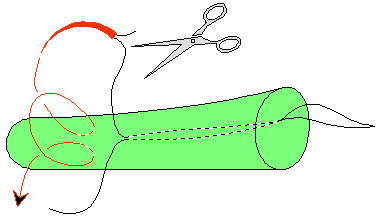
This is a simple technique for rapid placement of a two strand core tendon suture. It is most quick using a looped suture, but a double armed suture can follow the same route.

The first pass is transverse, in and out. The needle is passed through
the trailing loop to lock.

The needle is run in a longitudinal intratendinous path across the tendon
juncture then back out.

One of the sutures is detached from the needle - otherwise the double suture
knot is huge - and a locking stitch is placed. A standard Kessler would
be fine, but a reverse Kessler is more quick and simple, as shown
below. This is really an inside-out Kessler, with the corner loops on the
inside and the locking intersection on the outside.


One more time for the reverse Kessler diagram - the dotted lines are
intratendinous - the mirror image of a standard Kessler, with the tendon
surface being the mirror.
.
Clinically, this appears to provide a strong junction, and with a 4-strand repair, has stood up to a postop active flexion program in my practice. Knots on the outside do not permit large (0) or monofilament core sutures. It is certainly easier to perform than standard Kessler technique when tendon exposure is limited or awkward.